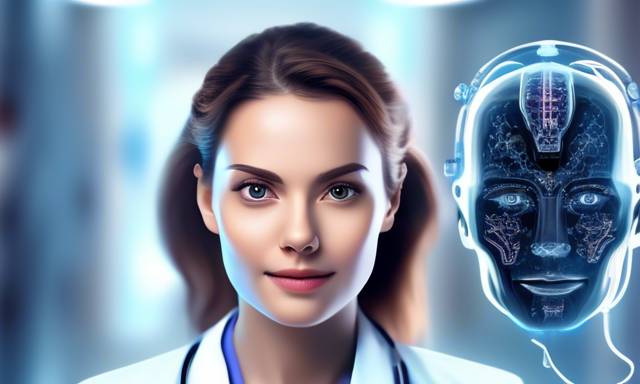Exploring AI’s Transition into Healthcare: A Bright Future Ahead 🚀
The integration of artificial intelligence (AI) into the healthcare field is already yielding practical applications. As AI technology continues to evolve, its potential to revolutionize various sectors, particularly healthcare, is becoming increasingly evident. This year, the healthcare landscape is experiencing remarkable advancements driven by AI, demonstrating its ability to enhance research, diagnostics, and patient care.
The Impact of AI on the Healthcare Landscape 🌍
Healthcare stands as one of the domains where AI’s contributions are most pronounced. The ability of AI to manage and analyze vast quantities of data is invaluable, particularly in research scenarios where such analyses can lead to significant breakthroughs. The healthcare sector heavily relies on data-driven insights, and AI provides a robust means to streamline this process, enabling researchers to focus on more strategic tasks.
In addition to healthcare, AI’s influence is spanning numerous areas, including environmental science and aerospace. For instance, industry leaders like Sam Altman, co-founder and CEO of OpenAI, highlight the profound potential AI holds for expedited progress across various sectors. This year marks a pivotal point for scientific inquiries as AI technology gains traction, providing scholars with tools that enhance their investigative capabilities invaluable in the field.
AI Innovations in the Healthcare Sector 🔬
The strong relationship between healthcare and scientific research propels AI’s growing role in this arena. It is no surprise that AI applications are finding their way into drug discovery, imaging techniques, diagnostics, and overall healthcare delivery systems. These advancements represent merely the initial phases of a promising journey, with the potential for AI to play an increasingly comprehensive role.
While healthcare professionals will continue to be at the forefront of patient care, AI tools are becoming vital allies. These technologies are designed to boost efficiency, accuracy, and reliability in clinical settings, ultimately minimizing errors and enhancing service quality.
AI in Drug Discovery: A Game Changer 💊
Among the most exciting applications of AI in healthcare, drug development stands out. The search for new drug compounds—encompassing thousands of natural and numerous synthetic molecules—poses an enormous challenge. Traditional laboratory testing can be time-consuming and sometimes impractical.
With the aid of AI, researchers can leverage advanced tools, such as neural networks, to analyze millions of compounds and predict their potential efficacy. This approach significantly accelerates the drug discovery process, reducing both the time and financial investments needed to advance compounds to clinical trials. Furthermore, it alleviates the ethical concerns associated with testing on animals or human subjects.
Enhancing Imaging Techniques with AI 🖼️
The application of AI in medical imaging is particularly noteworthy. Numerous applications now assist healthcare operators in acquiring high-resolution ultrasound images for preliminary disease detection, eliminating the need for specialized expertise. These tools not only facilitate quality image capture but also support interpretation, enhancing diagnostic accuracy.
This technology extends to radiography as well, where AI systems can analyze chest X-rays within seconds, identifying anomalies efficiently. Research indicates that AI applications designed to interpret radiographic images can operate up to 10,000 times faster than an average radiologist, highlighting their value in reducing diagnostic wait times and improving outcomes. The ability to detect smaller abnormalities can lead to earlier interventions, especially in serious conditions like lung cancer.
AI’s Role in Diagnostics 🩺
Beyond imaging, AI applications are transforming the diagnostic landscape. Specialized systems have emerged to assist physicians in decision-making processes, integrating predictive analytics and natural language processing capabilities. These tools support enhanced patient evaluations and tailored treatment plans.
Moreover, such applications optimize resource management, streamline prescription practices, and simplify operations, paving the way for improved healthcare delivery. The merging of AI technology with clinical workflows enables a more refined patient care approach, aligning with each individual’s unique needs.
AI in Patient Care and Management 🏥
AI innovations extend further, with numerous applications automating various healthcare services. For example, voice recognition technology is being employed to aid healthcare professionals in communicating effectively with patients, including those with language barriers. Furthermore, these systems facilitate remote consultations using popular video conferencing tools.
In addition, many AI systems have been developed to enhance patient services by handling administrative tasks such as appointment scheduling, data analysis, and patient follow-ups. While many current applications focus on individual solutions, a future integration of these tools could lead to more interconnected systems that collectively enhance patient care.
Though significant strides have been made, the journey towards fully harnessing AI’s capabilities in healthcare is just beginning. Continuous developments and innovations promise to shape an incredibly dynamic future for healthcare, fostering improvements in efficiency and patient outcomes.
In summary, artificial intelligence stands poised to transform the healthcare industry significantly as its potential becomes more apparent and its applications more sophisticated. This year indicates an exciting period of transition and adaptation, promising a future enriched by these technological advancements.
Sources:
OpenAI





 By
By

 By
By

 By
By